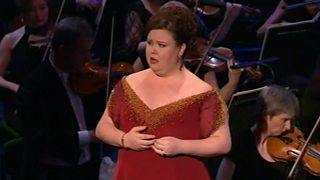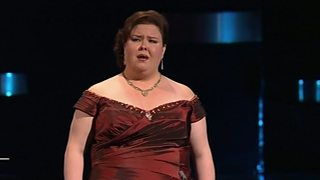USA: Jamie Barton
Mezzo-soprano - born 1981
Winner, 91�ȱ� Cardiff Singer of the World and Song Prize
Jamie Barton was born in Rome, Georgia and studied at Shorter College there before attending Indiana University. From 2007-2009 she was a member of Houston Grand Opera Studio. Awards include the 2007 Metropolitan Opera National Council Auditions, when she was a National Winner. In 2012 she received the Richard Tucker Career Grant from the Richard Tucker Foundation.
Jamie made her UK debut in 2012 at the Barbican Centre in Elgar’s Sea Pictures. Last season, she made her Lyric Opera of Chicago debut with productions of Les contes d’Hoffmann, Boris Godunov and Ariadne auf Naxos, followed by The Golden Ticket with Atlanta Opera and ��ö�ٳٱ����ä��������ܲԲ� with Bayerische Staatsoper.
Concert engagements include Bernstein’s Opening Prayer and Jeremiah Symphony with Colorado Symphony, Mozart’s Requiem with Milwaukee Symphony Orchestra and Beethoven’s Symphony No 9 with Omaha Symphony. In recital she appeared with the Vocal Arts Society at the Kennedy Center and as a guest soloist in the Marilyn Horne Foundation Gala at Carnegie Hall.
Future plans include the role of Julia Child in Bon Appetit! with Opera Memphis and a return to the Lyric Opera of Chicago as Magdalene Die Meistersinger with Sir Andrew Davis.
Jamie enjoys white water rafting, camping, reading and cooking.
- Winner of Concert One
- Song Prize finalist
- Finalist
- Song Prize Winner
- Main prize winner
Final repertoire
Acerba voluttà (Adriana Lecouvreur) Cilea
The Princess de Bouillon is waiting to have a secret tryst with her lover, Maurizio. She sings of the bitter pleasures and the tortures of love.
Ja, Gretelchen…Hurr, hopp hopp! (Witch's Aria) Hänsel und Gretel Humperdinck
In this aria, the witch, who enjoys eating children, plans to cook Hansel and Gretel before hopping on to her broom for a ride across the skies.
Var det en dröm? (Op 37 No 4) Sibelius
In ‘Was it a dream?’ the lover is remembering the beloved in the days when they were together. There are reminiscences of gifts and sweet glances - and tears when they parted. But was it all a dream? If so, it was the best dream of all. This Swedish poem is by JJ Wecksell.
Je vais mourir…Adieu, fière cité (Les Troyens) Berlioz
Didon, Queen of Carthage, has fallen deeply in love with Enée, a Trojan warrior. When he leaves her court to follow his destiny she is overwhelmed with grief. She can think of nothing else she wants except to die.
Song Prize Final repertoire
Music for a while - Purcell/Britten
This comes from Purcell’s incidental music for John Dryden and Nathaniel Lee’s play Oedipus. ‘Music for a while will all your cares beguile’ is sung by a priest, trying to conjure up the ghost of King Laius to find out who murdered him. These Purcell settings were re-arranged by Britten in 1944 for Joan Cross.
Meine Liebe ist grün (Op 63 No 5) – Brahms
‘My love is green’ sets words by Felix Schumann, son of Robert and Clara. The singer’s love is as green as the lilac bush and as fair as the sun that shines on it, filling it with joy and fragrance. His own soul has nightingale’s wings and sits in the lilac blossom, overwhelmed by the fragrance, singing love-drunk songs.
Unbewegte laue Luft (Op 57 No 8) – Brahms
Nature is at rest in the still, warm air, with only the splash of the fountain in the garden. But the poet’s heart is full of hot desires and a lust for life. Surely his beloved should be filled with his longing wishes; the call of his soul should echo in hers. He begs her to hurry to him so they can find ecstasy together.
Svarta rosor (Op 36 No 1) - Sibelius
‘Black Roses’ is a poem by Ernst Josephson. Why is the singer, usually so merry, so sad today? It is because a tangle of the black roses of sorrow grows around her heart, their sharp thorns making painful wounds. They have driven away all joy.
Flickan kom ifrån sin älsklings möte (Op 37 No 5) - Sibelius
In ‘The maiden’s tryst’, the girl returns to her mother with red hands, then red lips, and then pale cheeks. His hands made her hands red, his kisses reddened her lips, and then his faithlessness made her cheeks grow pale. She asks her mother to prepare her grave and carve this story on the cross that marks it. The poem is by Runeberg.
I wait for you (Op 14 No 1) – Rakhmaninov
At the beginning of each verse, the poet calls out to the beloved that he will wait for her. The sun has set and night has killed the day – he waits in anguish for his beloved, counting the moments until he sees her. The text is by George Friedrich Daumer.
Glory to God – Rakhmaninov
Everything wants to sing and glorify God: the dew, the lily-of-the-valley, the grass, the forest, the field, the road and the dust in the wind.They call out through the ages, and man echoes their song.
��
The Housatonic at Stockbridge – Ives
Der König in Thule – Schubert
Gretchen am Spinnrade – Schubert
La vie antérieure – Duparc
Ho il cor gonfio di lagrime…Stella del marinar! (La Gioconda) – Ponchielli
Laura is about to sail away with her lover, Enzo. She prays to the seafarers’ star, the holy Virgin, for protection, asking for forgiveness and the Virgin’s blessing. Her passion is so strong that it is forcing her to leave her husband and elope with another woman’s fiancée.
Sabbath Morning at Sea (Sea Pictures) – Elgar
This orchestral song is the centerpiece of Elgar’s Sea Pictures, a collection of five songs written for the 1899 Norwich Festival and first performed by Clara Butt. In this poem by Elizabeth Barrett Browning, the lonely, weary traveller contemplates the turbulent sea and heavy skies. Though far from church on the Sabbath day, the traveller takes comfort and inspiration from the sea - this mighty creation of the Creator – and its song.
L'ai-je bien entendu?…O mon Fernand (La favorite) - Donizetti
Spain, around 1340. Alfonso XI, King of Castile, has allowed his mistress Leonora to marry Fernando, the man she truly loves, as a reward for Fernando’s victory over the Saracens. After her initial joy, Leonora realises that she will have to tell Fernando the truth about her relationship with the king. She sees her sufferings written in the heavens, and imagines herself rejected and veiled in black.

























